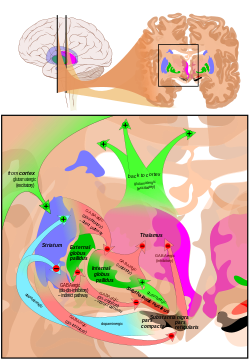Hyperkinesia

Editor-In-Chief: Prab R Tumpati, MD
Obesity, Sleep & Internal medicine
Founder, WikiMD Wellnesspedia &
W8MD's medical weight loss NYC, sleep center NYC
Philadelphia medical weight loss and Philadelphia sleep clinics
| Hyperkinesia | |
|---|---|

| |
| Synonyms | N/A |
| Pronounce | N/A |
| Specialty | N/A |
| Symptoms | Excessive, involuntary movements |
| Complications | Injury due to uncontrolled movements |
| Onset | Varies depending on underlying cause |
| Duration | Can be chronic or episodic |
| Types | N/A |
| Causes | Genetic disorders, brain injury, medication side effects |
| Risks | Family history, neurological disorders |
| Diagnosis | Clinical assessment, neuroimaging |
| Differential diagnosis | Hyperactivity, dyskinesia, tremor |
| Prevention | N/A |
| Treatment | Medications, physical therapy, surgery |
| Medication | N/A |
| Prognosis | Varies; depends on underlying cause and treatment |
| Frequency | Rare; specific prevalence depends on underlying condition |
| Deaths | N/A |
File:Hemichorea and dystonia.ogv



Hyperkinesia is a medical condition characterized by an excess of movement. It is a symptom rather than a disease and can be caused by a variety of conditions, including Parkinson's disease, Huntington's disease, and certain types of drug toxicity. Hyperkinesia can manifest in a variety of ways, including tremors, tics, and chorea.
Causes[edit]
Hyperkinesia can be caused by a variety of conditions. These include:
- Parkinson's disease: This is a degenerative disorder of the nervous system that primarily affects the motor system. Symptoms generally come on slowly over time and include shaking, rigidity, slowness of movement, and difficulty with walking.
- Huntington's disease: This is a genetic disorder that causes the progressive breakdown of nerve cells in the brain. It has a broad impact on a person's functional abilities and usually results in movement, thinking, and psychiatric disorders.
- Drug toxicity: Certain drugs, particularly those used to treat psychiatric conditions, can cause hyperkinesia as a side effect.
Symptoms[edit]
The symptoms of hyperkinesia can vary depending on the underlying cause. They can include:
- Tremors: These are an involuntary, rhythmic muscle contraction leading to shaking movements in one or more parts of the body.
- Tics: These are sudden, rapid, repetitive movements or sounds that people do repeatedly.
- Chorea: This is characterized by brief, semi-directed, irregular movements that are not repetitive or rhythmic, but appear to flow from one muscle to the next.
Treatment[edit]
Treatment for hyperkinesia typically involves addressing the underlying cause. This can involve medication, physical therapy, or in some cases, surgery.
See also[edit]
Ad. Transform your life with W8MD's Budget GLP-1 injections from $75


W8MD offers a medical weight loss program to lose weight in Philadelphia. Our physician-supervised medical weight loss provides:
- Weight loss injections in NYC (generic and brand names):
- Zepbound / Mounjaro, Wegovy / Ozempic, Saxenda
- Most insurances accepted or discounted self-pay rates. We will obtain insurance prior authorizations if needed.
- Generic GLP1 weight loss injections from $75 for the starting dose.
- Also offer prescription weight loss medications including Phentermine, Qsymia, Diethylpropion, Contrave etc.
NYC weight loss doctor appointmentsNYC weight loss doctor appointments
Start your NYC weight loss journey today at our NYC medical weight loss and Philadelphia medical weight loss clinics.
- Call 718-946-5500 to lose weight in NYC or for medical weight loss in Philadelphia 215-676-2334.
- Tags:NYC medical weight loss, Philadelphia lose weight Zepbound NYC, Budget GLP1 weight loss injections, Wegovy Philadelphia, Wegovy NYC, Philadelphia medical weight loss, Brookly weight loss and Wegovy NYC
|
WikiMD's Wellness Encyclopedia |
| Let Food Be Thy Medicine Medicine Thy Food - Hippocrates |
Medical Disclaimer: WikiMD is not a substitute for professional medical advice. The information on WikiMD is provided as an information resource only, may be incorrect, outdated or misleading, and is not to be used or relied on for any diagnostic or treatment purposes. Please consult your health care provider before making any healthcare decisions or for guidance about a specific medical condition. WikiMD expressly disclaims responsibility, and shall have no liability, for any damages, loss, injury, or liability whatsoever suffered as a result of your reliance on the information contained in this site. By visiting this site you agree to the foregoing terms and conditions, which may from time to time be changed or supplemented by WikiMD. If you do not agree to the foregoing terms and conditions, you should not enter or use this site. See full disclaimer.
Credits:Most images are courtesy of Wikimedia commons, and templates, categories Wikipedia, licensed under CC BY SA or similar.
Translate this page: - East Asian
中文,
日本,
한국어,
South Asian
हिन्दी,
தமிழ்,
తెలుగు,
Urdu,
ಕನ್ನಡ,
Southeast Asian
Indonesian,
Vietnamese,
Thai,
မြန်မာဘာသာ,
বাংলা
European
español,
Deutsch,
français,
Greek,
português do Brasil,
polski,
română,
русский,
Nederlands,
norsk,
svenska,
suomi,
Italian
Middle Eastern & African
عربى,
Turkish,
Persian,
Hebrew,
Afrikaans,
isiZulu,
Kiswahili,
Other
Bulgarian,
Hungarian,
Czech,
Swedish,
മലയാളം,
मराठी,
ਪੰਜਾਬੀ,
ગુજરાતી,
Portuguese,
Ukrainian


